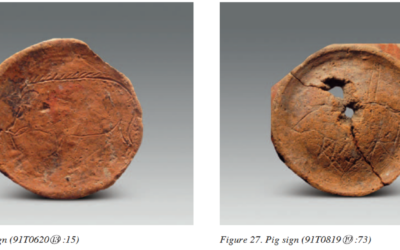The Filial Peasant Girl – A Buddhist Miracle Tale
With the arrival of Buddhism in China, in addition to translating the main canonical scriptures, other more popular religious literature began to emerge, which by means of some tales narrating either the benefits of having faith in Buddha or the punishments of not following his precepts, tried to instill in the minds of uneducated people, a new religious morality. One of the most popular anthologies was written by Wang Yan in the 5th century and was entitled Mingxiang ji 冥祥記 or Record of Signs of the Unseen World. I translate a beautiful example from this anthology.
In the village of Lijia, a farmer’s wife took food to the field for her husband twice a day, in the morning and in the evening, and she always saw a young girl following her wherever she went. When she asked the other women farmers who delivered the food with her, they all said they had not seen anybody. This frightened the farmer’s wife even more and kept her on her toes all day.
At dusk, the mysterious woman followed her to her house, but without entering it, she hovered in the yard or in the nearby alley. If the peasant woman advanced toward her, she retreated. When the peasant woman returned to her place, she would approach again, always at a short distance. The peasant woman then thought that this female ghost must be her enemy.
So one day, she had the courage to stand in front of her and said, «If you have something to say, say it, and don’t follow me so close and far!»
The mysterious woman replied, «In a former life you and I were concubines of a rich and powerful family. Jealous that I was favored by our master, you falsely accused me of fornication and theft. My master listened to your slander and locked me up, causing me to die of depression. Now, I have come to seek your life. But you have served your mother-in-law with great filial piety in this life, and there are always good gods who protect you in secret, with the result that I cannot approach you. I have followed you all these days, looking for an opportunity to attack you. But I have carefully assessed the situation and it seems that there is not much chance for revenge. If you can invite a monk to give a sermon to release me so that I can be reincarnated soon, our grievance will be settled.»
The peasant woman said, «My family is poor, how can I afford to pay for a sermon for you?»
The female ghost said, «It is true that your family is poor. But if you can chant ‘Namo Amitabha Buddha’ ten thousand times with a devoted heart, you can also redeem me.»
The peasant woman asked, «How can you redeem a ghost only by chanting to Buddha?»
The female ghost said, «An ordinary person reciting the Buddha’s name will naturally find it difficult to correspond with the Buddha because of her distracted mind. If the person is a loyal and filial son, his sincerity will move the gods and buddhas. When they recite a prayer to the Buddha, their voice reaches the three worlds. Therefore, the merit and power of your prayer is equal to that of chanting sutras. You are a filial woman, I believe that if you pray to Buddha with your utmost sincerity, you will naturally be able to feel his power.»
After hearing her words the peasant woman prayed to Buddha with devotion, bowing toward the west each time she repeated her mantra. In this way she chanted it 10,000 times and the female ghost disappeared.
The older people of Lijia village often spoke of this incident. It shows that sincere filial piety toward both parents is as meritorious as worshipping Buddha with faith.
Last posts
The Shuangdun Signs and the Origins of Chinese Writing
The Shuangdun Signs and the Origins of Chinese Writing When the origins of Chinese writing are discussed, attention almost always turns to the oracle bones of the Shang dynasty. Yet thousands of years before characters were carved onto turtle plastrons, surprisingly...
Zhangjiajie: The Sublime Landscape of the Film Avatar
Zhangjiajie: The Sublime Landscape of the Film Avatar Zhangjiajie is now one of my favorite destinations in China. Not only does it boast some of the country’s most spectacular landscapes, but in recent years it has continued to work on turning these places into...
Geckos and the “Mark of Chastity” in Imperial China: History, Symbolism, and Cultural Context
Geckos and the “Mark of Chastity” in Imperial China: History, Symbolism, and Cultural Context Across the long span of imperial Chinese history, the gecko occupied a surprisingly prominent place in discussions of female chastity, bodily integrity, and the regulation of...







